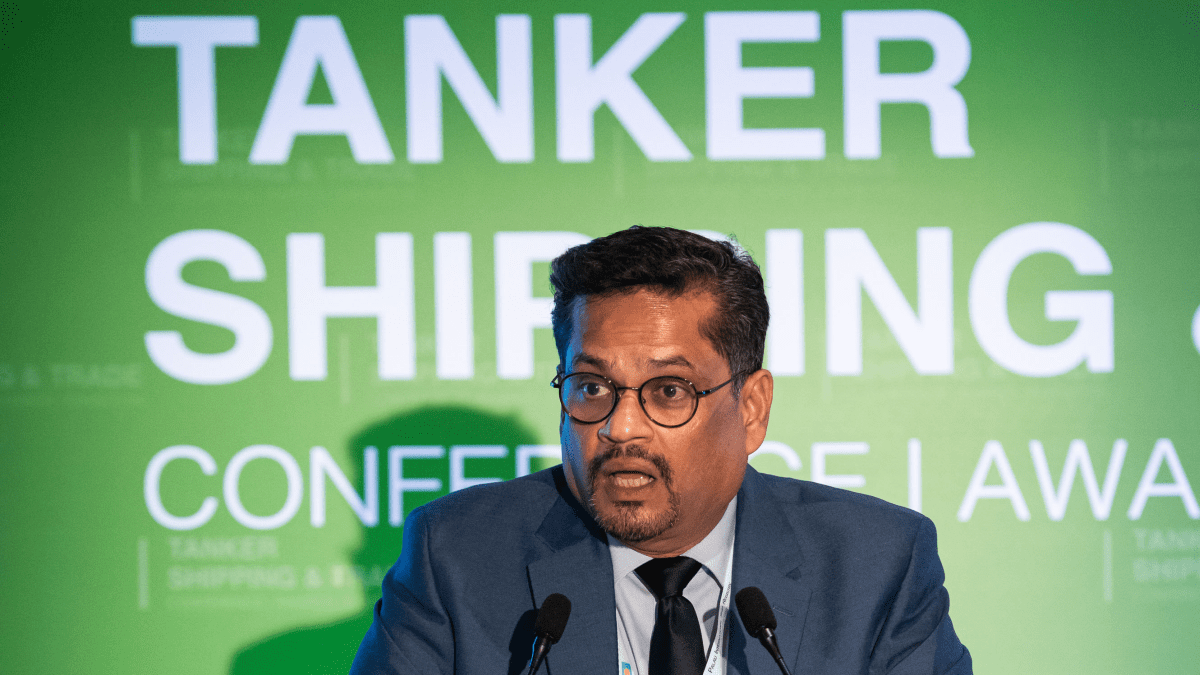 Madhu Vadakkepat (N1 Commercial & N2 tankers): “Commodity transport is the cheapest way to move cargo, but the return on investment is only 3%” (source: Riviera Maritime Media)
Madhu Vadakkepat (N1 Commercial & N2 tankers): “Commodity transport is the cheapest way to move cargo, but the return on investment is only 3%” (source: Riviera Maritime Media)
No two companies will share the same pathway to decarbonisation; there are difficult questions to ask and many options to explore
Tanker shipping has to face some harsh realities on the road to decarbonisation. One of the most fundamental is which fuel pathway to choose to achieve the regulatory goals set by IMO and other bodies. A straight pathway direct to non-carbon emission fuel is not available – no shipyard is able to offer an ammonia- or hydrogen-powered tanker at the moment, and may not be able to do so for a few years to come.
In the fourth session of the Tanker Shipping & Trade Conference, Awards and Exhibition, held in Athens in November 2022, speakers shared their experiences on tackling this conundrum.
N1 Commercial & N2 tankers director Madhu Vadakkepat explained the difficulty of providing investors with a business model in such an environment, while Newport Shipping group manager and managing director Oslo Lianghui Xia made the case for retrofitting LNG dual-fuel power on existing modern tankers.
Methanol is now being considered as a transition fuel for the marine industry and DNV Maritime vice president & business director Tankers, Catrine Vestereng, explained to the conference its application in the marine sector. ECOLOG chief commercial officer Jasper Heikens explained how a well-established Greek shipping company has seen an opportunity in providing a solution for the removal and storage of CO2 waste.
Mr Vadakkepat asked a question that many vessel owners and operators must be asking themselves in private: “Commodity transport is the cheapest way to move cargo, but the return on investment is only 3%. Why would the shipowner go for spending US$70M [on a new tanker], when you might as well invest in a mutual fund?”
There has to be a good business case to invest US$70M in an Aframax tanker with the latest decarbonisation technology. “How many timecharters have been seen with a length of 10-plus or 15-years plus?”
In his opinion, these are simply not available with the revenue per day to justify capex and opex, and a reasonable level of profit: “I have not seen timecharters with a level that justifies going to a shipyard for an ammonia- or hydrogen-powered vessel.”
Mr Vadakkepat noted that one justification given by charterers for not paying the required rate is commercial pressure. He questioned this explanation: “Shipping is a commercial adventure. Ships are not built to make blue skies.”
The rationale, he noted, was for shipowners to invest in ships to make money, within the envelope of the safety protocols, legislation and commercial imperative. “There has to be a commercial adventure success story behind every investment spanning 10 or 15 years,” he said.
But the commercial adventure is cyclical – before the invasion of Ukraine, the timecharter rates for Aframax were around US$13,000 per day, which he noted was too low for investors in the sector. Following the invasion, rates have soared to US$30,000 per day, but Mr Vadakkepat reported that this was just as hard to justify to investors.
In a poll, delegates were asked: do shipowners have sufficient commercial justification to invest in shipboard carbon capture or alternative investments (e.g. hull air-lubrication systems) in the immediate future (<3 years)? The results were close, with 41% feeling there was insufficient justification while 38% replied there was sufficient justification; 21% were not sure.
Mr Vadakkepat also cautioned delegates struggling with shipping decarbonisation. He noted that in his travels and business dealings around Asia and India, decarbonisation is hardly mentioned. He said this is largely a US and European obsession and cautioned that there are inherent dangers in one side pursuing a decarbonisation agenda which is largely being ignored elsewhere.
What cannot be ignored is that LNG as a marine fuel has gained a strong hold on the newbuilding market, and with certain charterers, like Shell. The conversion of modern tankers to LNG dual fuel was the subject of Newport Shipping group manager and managing director Oslo Lianghui Xia’s presentation.





